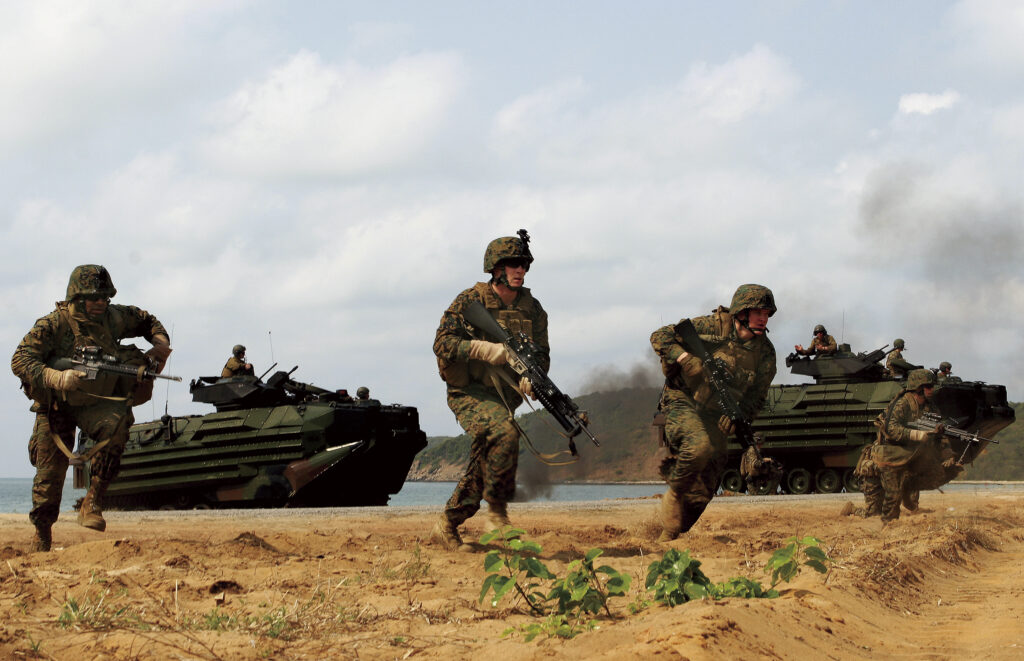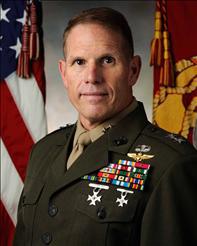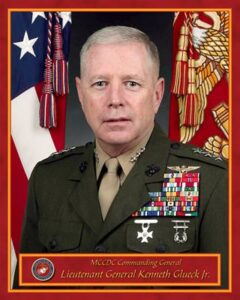Gen. Walsh Taking Custody Of Marine Corps’ Soul: Where’s Glueck Going?
Posted on

WASHINGTON: The most senior Marine on the Navy staff is going home to Quantico. It’s just 35 miles down I-95, but it’s a world away. Sometime this summer — the exact date’s still to be determined a Marine spokesman told me — Maj. Gen. Robert Walsh should pin on a third star and move from the thick of the Pentagon budget battles to the intellectual and spiritual center of the Marine Corps.

Maj. Gen. (soon Lt. Gen.) Robert Walsh
Walsh will replace Lt. Gen. Kenneth Glueck, whose next assignment hasn’t been announced. That’s triggered all sorts of speculation that Glueck will get a fourth star if the current Marine Commandant, Gen. Joseph Dunford, becomes chairman of the Joint Chiefs of Staff once Gen. Martin Dempsey retires this fall, as he’s expected to do.
In my experience of both men, Glueck has been consistently more quotable, while Walsh has been more cautious speaking in open forums. But that’s less about temperament than assignment, and I’ll be watching to see if Walsh opens up in his new job.
Currently, Walsh — a fighter pilot and graduate of Top Gun — is director of the expeditionary warfare division (OPNAV N95) on the Chief of Naval Operation’s staff. That gives him a wide portfolio, from amphibious assault ships to minesweepers. (“I’ve done aviation requirements, I’ve done ground requirements, [and] ship requirements,” Walsh said at an NDIA expeditionary warfare conference in 2013. “This mine warfare area to me is the most challenging.”) But a lot of it boils down to fighting for money to build ships.
“Up there in the Pentagon, it’s certainly a fight for resources, [both] within DoD and within OPNAV,” Walsh told NDIA. “It’s a real constant fight.” It’s also a fight behind closed doors, with the Pentagon keeping its internal deliberations and recriminations out from the press and away from Congress as much as possible.

Lt. Gen. Kenneth Glueck
By contrast, while Kenneth Glueck — a helicopter pilot who flew President Reagan — still worries about money, his job requires him to dream big dreams — and then sell those dreams to the widest possible audience. Well, technically, that’s jobs, plural: Glueck is, and Walsh will be, both (deep breath now) [1] Deputy Commandant for Combat Development and Integration and [2] the commander of Marine Corps Combat Development Command (MCCDC).
The Deputy Commandant job oversees the analysts, futurists and visionaries who develop both broad concepts and specific requirements for future Marine Corps operations and equipment. That includes men like Brig. Gen. Kevin Killea, head of the celebrated Marine Corps Warfighting Laboratory, who recently talked about using animals like termites as models for the behavior of autonomous drones.
MCCDC oversees all Marine Corps training, from boot camp drill instructors at Parris Island to graduate school professors at Marine Corps University. Yes, Quantico has a grad school: Marines may cultivate an image of gung-ho men of action, but their ranks include some of the most thoughtful warrior-humanists I’ve ever known.
As commander of these intellectual powerhouses, Glueck has led development of the Marine Corps’ concept for fighting in the post-Afghan and Iraq wars world, Expeditionary Force 21. That EF-21 work, in turn, shaped the tri-service (Marine, Navy, and Coast Guard) Cooperative Strategy for 21st Century Seapower.
Glueck’s also been heavily involved in the agonies of the Amphibious Combat Vehicle program. While he isn’t an acquisition official, he’s worked to make requirements more realistic and concepts more achievable when the original idea of a water-skiing tank proved impractical. Glueck has also worked on Marine Corps helicopter programs — he’s a chopper pilot himself — and on integrating the F-35B fighter into Marine forces.
Walsh’s legacy from his current job, by contrast, isn’t Marine Corps programs at all: It’s ships. He worked on both traditional amphibious warships, e.g. helping choose an affordable derivative of the existing LPD-17 design for the new LX(R) class, and on non-traditional, non-combat platforms for Marine operations like the Afloat Forward Staging Base. One of Walsh’s repeated messages has been that both types of ships are necessary: Battle-worthy amphibs are superior for most operations and essential for combat operations, he says, but the Navy can’t afford enough to meet peacetime demand for Marine Corps presence, and the non-traditional vessels can fill that gap without breaking the bank.
When Walsh moves from the Navy staff to Quantico, he’ll move from shipbuilding budgets to Marine Corps concepts. With the first F-35B squadron going operational this fall, and the Amphibious Combat Vehicle competition heating up, he’ll have plenty to work on.
Subscribe to our newsletter
Promotions, new products and sales. Directly to your inbox.
